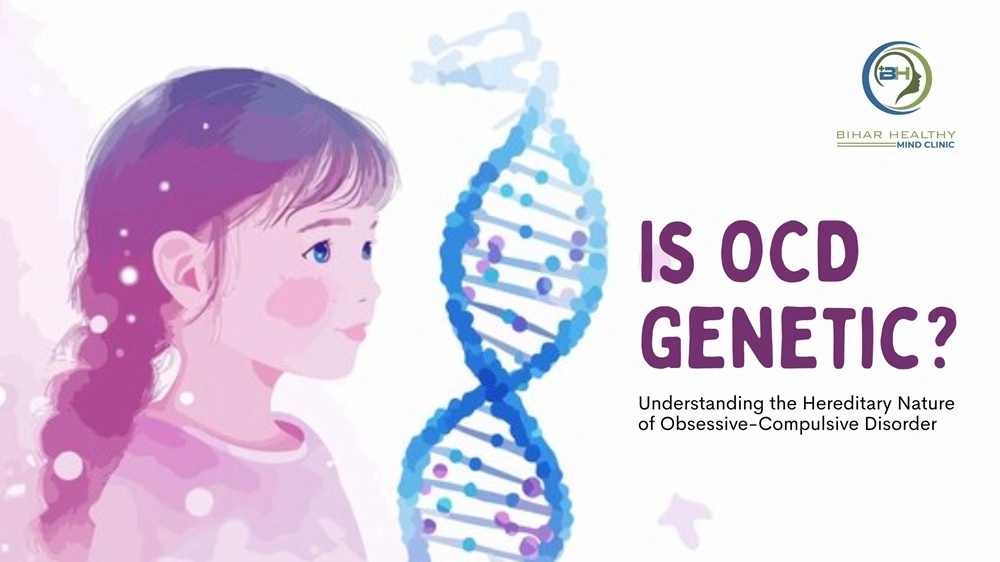
Obsessive-Compulsive Disorder (OCD) is a chronic mental health condition that causes unwanted thoughts, repetitive behaviors, and compulsions. For decades, researchers and clinicians have tried to uncover one of the most frequently asked questions: is OCD genetic? Understanding whether OCD is hereditary or influenced by environmental and psychological factors can help improve early diagnosis, prevention, and treatment.
At Patna Psychiatry, under the expert guidance of Dr. Saurabh Kumar, MD (Psychiatry), widely regarded as the best psychiatrist in Patna, patients receive personalized, evidence-based psychiatric care for a wide range of mental health issues, including OCD. This article explores whether OCD truly runs in families and what science says about its genetic roots.
What Is OCD?
Obsessive-Compulsive Disorder is characterized by intrusive, distressing thoughts (obsessions) and repetitive actions (compulsions) performed to reduce anxiety. For example, a person might repeatedly check door locks, wash hands excessively, or engage in mental rituals to prevent harm or control fear. OCD affects both children and adults, often emerging in adolescence or early adulthood.
While the exact cause remains unclear, multiple factors such as biological, psychological, and environmental are known to contribute to the onset of OCD.
Is OCD Genetic? What Research Says
Scientific research suggests that genetics play a significant role in the development of OCD. Family and twin studies have shown that individuals with first-degree relatives (parents, siblings, or children) who have OCD are at a higher risk of developing the disorder themselves.
According to genetic studies, OCD tends to run in families, indicating that hereditary factors influence susceptibility. However, no single “OCD gene” has been identified. Instead, researchers believe that a combination of multiple genes, each contributing a small effect, collectively increases the risk.
Twin studies reinforce this understanding. Identical twins, who share 100% of their genetic material, have a higher rate of both developing OCD compared to fraternal twins, who share only 50% of their genes. This supports the hypothesis that OCD is partly genetic, although environment also plays a crucial role.
Is OCD Hereditary or Environmental?
When exploring whether OCD is hereditary, it’s essential to distinguish between genetic predisposition and environmental influence. While genes may make someone more vulnerable, environmental triggers often determine whether OCD symptoms appear.
-
Factors that may trigger or worsen OCD symptoms include:
- Stressful life events (trauma, major transitions, or chronic stress)
- Infections or immune responses (as in PANDAS - Pediatric Autoimmune Neuropsychiatric Disorders Associated with Streptococcal infections)
- Personality traits such as perfectionism or heightened anxiety
- Parenting style and early childhood experiences
In short, having a family history increases risk but does not guarantee that a person will develop OCD. Many people with genetic predispositions never experience the condition at all.
Genes Linked to OCD
Researchers have discovered several genes potentially linked to OCD symptoms. Some of these genes influence serotonin and dopamine regulation, neurotransmitters essential for mood and behavior control. Variations in these genes can affect how the brain processes anxiety and repetitive thoughts.
-
Some studies have highlighted genes such as:
- SLC1A1 – linked to glutamate regulation in the brain.
- HTR2A – affects serotonin receptors and mood regulation.
- COMT – involved in dopamine breakdown, influencing cognitive function.
However, it’s important to note that OCD is polygenic—meaning it’s influenced by multiple genes rather than one dominant hereditary factor. Environmental stressors, upbringing, and brain chemistry interact with these genes to determine whether the disorder manifests.
Family History and Early Intervention
Since OCD can be hereditary, awareness of family history is vital. Families that have one or more members with OCD should remain alert to early warning signs in children or adolescents, such as excessive reassurance-seeking, repetitive behaviors, or persistent intrusive thoughts.
Early intervention can make a major difference. At Patna Psychiatry, comprehensive evaluation, therapy, and medication management are used to help individuals regain control over obsessive thoughts and compulsive actions. Dr. Saurabh Kumar, recognized as the best psychiatrist in Patna, emphasizes that early diagnosis allows for more effective, long-term treatment outcomes.
Can You Prevent OCD if It Runs in Your Family?
While it may not be possible to entirely prevent OCD in individuals with a genetic predisposition, lifestyle and environmental management can help reduce risk and severity. Maintaining emotional stability, reducing stress, practicing mindfulness, and fostering supportive relationships are valuable preventive measures.
Parents can also model balanced coping mechanisms and seek professional help if anxiety symptoms appear early. Early cognitive-behavioral therapy (CBT) can significantly reduce the progression of symptoms.
Treatment for OCD at Patna Psychiatry
At Patna Psychiatry, treatment plans are tailored to each patient’s unique profile. The approach combines psychotherapy (especially CBT and Exposure and Response Prevention Therapy) with evidence-based pharmacotherapy when needed.
Dr. Saurabh Kumar and his team use a holistic approach that addresses both the biological and psychological roots of OCD, helping patients lead more fulfilling, controlled, and anxiety-free lives. Whether your concern is “is OCD genetic” or you’re already noticing symptoms, seeking help from a qualified specialist is the best first step.
Final Thoughts
So, is OCD genetic? The answer is - partially yes, but not entirely. Genetics can increase susceptibility, but environmental influences and individual experiences largely determine who develops the disorder. Understanding this balance between nature and nurture is essential to fostering empathy, awareness, and early intervention.
If you or someone you know struggles with OCD, visit Patna Psychiatry for comprehensive evaluation and treatment under the care of Dr. Saurabh Kumar, MD (Psychiatry), one of the best psychiatrists in Patna for OCD and related anxiety disorders.
Visitors: 41





No comments yet.